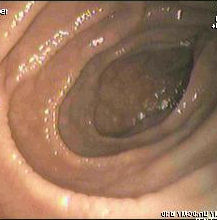Celiac disease (patient information): Difference between revisions
No edit summary |
No edit summary |
||
| Line 1: | Line 1: | ||
'''For the WikiDoc page for this topic, click [[Celiac disease|here]]''' | '''For the WikiDoc page for this topic, click [[Celiac disease|here]]''' | ||
{{SI}} | |||
==What is Celiac Disease?== | ==What is Celiac Disease?== | ||
[[Image:celiac 3.jpg|left|thumb|[[Endoscopy|Endoscopic]] still of [[duodenum]] of patient with coeliac disease showing scalloping of folds]] | |||
Celiac disease is a digestive disease that damages the small intestine and interferes with absorption of nutrients from food. People who have celiac disease cannot tolerate gluten, a protein in wheat, rye, and barley. Gluten is found mainly in foods but may also be found in everyday products such as medicines, vitamins, and lip balms. | Celiac disease is a digestive disease that damages the small intestine and interferes with absorption of nutrients from food. People who have celiac disease cannot tolerate gluten, a protein in wheat, rye, and barley. Gluten is found mainly in foods but may also be found in everyday products such as medicines, vitamins, and lip balms. | ||
Revision as of 16:50, 8 July 2009
For the WikiDoc page for this topic, click here
What is Celiac Disease?

Celiac disease is a digestive disease that damages the small intestine and interferes with absorption of nutrients from food. People who have celiac disease cannot tolerate gluten, a protein in wheat, rye, and barley. Gluten is found mainly in foods but may also be found in everyday products such as medicines, vitamins, and lip balms.
When people with celiac disease eat foods or use products containing gluten, their immune system responds by damaging or destroying villi—the tiny, fingerlike protrusions lining the small intestine. Villi normally allow nutrients from food to be absorbed through the walls of the small intestine into the bloodstream. Without healthy villi, a person becomes malnourished, no matter how much food one eats.
Celiac disease is both a disease of malabsorption—meaning nutrients are not absorbed properly—and an abnormal immune reaction to gluten. Celiac disease is also known as celiac sprue, nontropical sprue, and gluten-sensitive enteropathy. Celiac disease is genetic, meaning it runs in families. Sometimes the disease is triggered—or becomes active for the first time—after surgery, pregnancy, childbirth, viral infection, or severe emotional stress.
What are the Symptoms of Celiac Disease?
Symptoms of celiac disease vary from person to person. Symptoms may occur in the digestive system or in other parts of the body. Digestive symptoms are more common in infants and young children and may include:
- abdominal bloating and pain
- chronic diarrhea
- vomiting
- constipation
- pale, foul-smelling, or fatty stool
- weight loss
- Irritability is another common symptom in children. Malabsorption of nutrients during the years when nutrition is critical to a child’s normal growth and development can result in other problems such as failure to thrive in infants, delayed growth and short stature, delayed puberty, and dental enamel defects of the permanent teeth.
Adults are less likely to have digestive symptoms and may instead have one or more of the following:
- unexplained iron-deficiency anemia
- fatigue
- bone or joint pain
- arthritis
- bone loss or osteoporosis
- depression or anxiety
- tingling numbness in the hands and feet
- seizures
- missed menstrual periods
- infertility or recurrent miscarriage
- canker sores inside the mouth
- an itchy skin rash called dermatitis herpetiformis Template:WH Template:WS